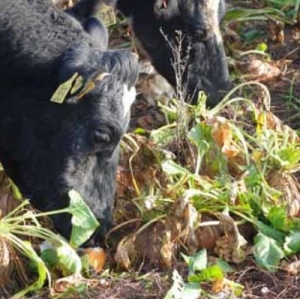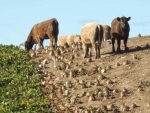LIVER DAMAGE is indicated in a DairyNZ analysis of the blood and autopsy samples the industry body collected from dairy cows experiencing ill-health after grazing on swedes in Southland.
DairyNZ regional team leader for Southland/South Otago Richard Kyte says the findings appear to be consistent with known liver damage associated with cows grazing brassica forage crops, except the visible signs of illness seemed to be more severe.
"While the study did not allow comparison between swede varieties, the findings indicate that cows experienced liver damage after grazing swede varieties other than the HT (herbicide tolerant) variety, regardless of whether there were visible signs of illness.
"The nature of the liver damage is similar to that seen in outbreaks of facial eczema with visible signs such as photosensitivity occurring after the liver has been damaged," says Richard.
"We've reviewed the published scientific data on this topic. It supports the possibility that substances in the swedes caused this disease.
"All brassica varieties produce a range of sulphur-containing substances (pre-toxins) such as glucosinolates and SMCO (S-methylcysteine sulphoxide) which are not toxic in themselves. Brassica pre-toxins are changed during rumen digestion into toxic agents such as nitriles. Nitriles are known to cause liver damage in rats."
Levels of glucosinolates and SMCO in plants can be affected by plant growth conditions, and are generally highest in mature plants and flower heads.
"However, we have to be careful about drawing any major conclusions from these findings. The analysis is based on samples collected at a single point in time towards the end of the period when the illness was evident. They were not collected over the whole swede grazing period.
"Additionally, only a selection of swede varieties was represented in the animal samples taken.
"The possibility of an unknown toxin causing this can't be discounted," he says.
The next step in the investigation is to collate and analyse the data from an in-depth survey of 120 farmers and their graziers. The survey is in the process of being completed.
"We have interviewed farmers across the region, both affected and unaffected by the issue, to help us understand whether farm management practices may have been a contributing factor."
"Understanding on-farm management practices is a vital piece of the jigsaw and we really appreciate the time and support farmers have provided us by completing the survey questionnaire," says Richard.
"We have also sought permission to access their relevant veterinary records. These could provide a wider dataset and help us understand the illness better and give us valuable insights into what happened this season in Southland."
Analysis of the survey data has now started, with findings expected in March.
To help understand how affected cows have recovered, an analysis of additional blood samples is also underway. Findings from this analysis are expected by the end of February.
The analysis of plant samples is expected to begin in February.
"We are working with New Zealand plant breeders and laboratories to ensure we use a consistent methodology for the analysis of the plant samples. That's vital to ensure we get some robust and useful information from that work."


















